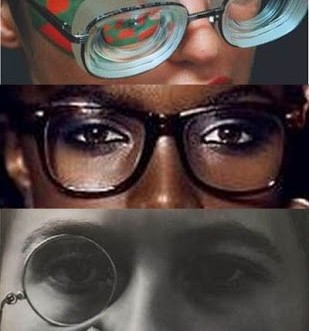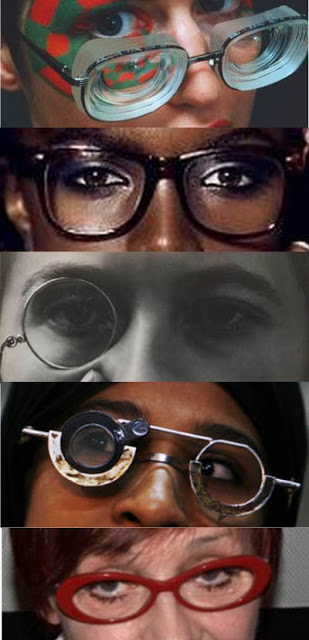Longtime readers may remember an invited post by Alexa, aka Blossoming Badass, that I ran some time ago as a teen perspective on the beauty mores of her generation. Alexa's writing first spoke to me because—at the risk of sounding like one of the adults in her poem "Lines Converging"—it reminded me of my own at her age. But in watching this particular badass blossom, I see that I was mistaken: Her voice has grown into one that mixes careful observance of self and others with searing moments of intensity—a mix that's quite a feat to pull off (and one I certainly couldn't as a college freshman, which she'll be this fall). I'm so glad to have Alexa back on The Beheld with this piece on navigating comfort, prettiness, and glasses...another feat I haven't yet been able to pull off! You can read more of Alexa's work on her Tumblr.
I was in eighth grade when I realized that only the weird kids still wore glasses.
It hadn’t always been this way. You couldn’t see the board? Or the words in books? You got some glasses! Most kids were reluctant, like me, to actually wear them. The reading-glasses kids were especially wary; I remember a boy named Robbie in my fourth-grade class kept them covertly in his desk except during silent reading time, when he huddled behind his book. I only saw him wearing them one day, when I had to stand behind Robbie’s desk to ask Mr. Fuller if I could use the restroom during silent reading. But still, it was better for girls to wear glasses than boys, anyway, because boys would fall and sometimes break theirs when they played soccer during recess.
I took a similar route, keeping my glasses in their bright-blue case in my cubby, only taking them out when I had to read the spelling list on the board for all of elementary school. In sixth grade, however, I decided I could start fresh and avoid this inconvenience by just wearing them every day. They were wire-framed and purple back then, the frames rounded rectangles, making my round face look even rounder. I would wear them for all of middle school, give or take a few weeks of seventh grade and all special occasions when my mom told me I had to wear contact lenses, which I found extremely uncomfortable.
But by eighth grade, the solid third of my grade who had worn glasses was diminished to a mere few. Girls who had special needs, boys from families we had deemed unusual, kids who still cried too much and wore the clothes their moms picked out for them. I wasn’t being mean, but I knew I wasn’t a Weird Kid. I was different, but I had friends. I was smart, but I wasn’t just a nerd; I understood what was going on with the other kids, what they liked and why they liked it, even if I was more of a spectator than a participant. It’s probably pertinent that seventh-into-eighth grade was the first time I felt fully alienated by my body, but I knew it was going to take more than hair straightening or makeup or contact lenses (the defenses of the other girls) to make me feel any better. That is, glasses removal wasn’t going to do anything drastic.
Eighth grade was when I really started to talk. About things I cared about. My clothing choices were mostly governed by two things, both of which were different from the other girls. My pants were never skin-tight and my skirts and shorts were never ever short, not because my parents were strict (trust me, my mom wished I would dress like the others), but because I thought my thighs were too fat and my hips were too wide already. And secondly, my shirts weren’t too tight either, but they were all covered in quotes and slogans and buttons expressing the things that I suddenly cared about. T-shirts, bought plain at Target and decorated with homemade iron-ons of my favorite quotes from famous women. I didn’t care if I looked pretty, if I wore glasses. I was suddenly really excited, and ready to change things. Lots of famous women in history wore glasses, like Eleanor Roosevelt at the United Nations, and Rachel Carson looking into a microscope. It didn’t matter if I did too.
Ninth grade, meanwhile, was when I became Cute. I looked young for my age. I still didn’t wear makeup, but my pants were slightly more normal-fitting. I had a squeaky little voice that spoke up and said honest true things that the bigger voices didn’t. I was lucky (or so I thought) that people listened, accepting my assertions as Cute instead of dismissing them as Annoying or Obnoxious, as they would have been if I was bigger and stronger about what I was saying. Quite relatedly, in the spring of ninth grade, I got my first pair of Cute glasses. They had plastic frames that looked like wood, and were more rectangular. I felt ok wearing them. Lots of people said they liked them, too. The glasses confirmed the Cute.
By ninth grade, I was much more torn up about the fact that I wasn’t pretty. It was rather cemented in my mind. In the preceding year, all of my friends had Become Pretty in some way.
There were lots of things you could be, I learned, that were all positive reflections of your face and makeup and clothes and weight and body and personality: You could be pretty. You could be lovely. You could even be hot. None of these words really allowed the presence of glasses on one’s face. (You could be beautiful, too, but that was a special word that wasn’t a reflection of you so much as it was that the person who was saying it liked you. Usually it was a grown-up who could tell that you were sad.)
Yet all around me, friends who were skinny and flat-chested rapidly developed breasts and hips while their stomachs stayed perfectly concave and their legs smooth and strong. Awkward friends with weird hair and funny clothes started to develop a style, to figure out how braiding or straightening or whatever else worked out for them. Braces were removed and somehow that made all the difference. They were suddenly pretty or cute or hot.
I was a different Cute, more bunny-cute than girl-cute. Cute like a fluffy pink tutu, not like a stretchy denim mini-skirt from Forever 21. And if I got too loud, I could tell even that would be taken away from me.
As one of only two freshman along with my friend Meghan in the Drama Club, Cute was the lot I received. (Meghan, even cuter, and spritely-tiny on appearance, but far snarkier once spoken to. She wore glasses and contacts alternately, about half and half, but she was already stunningly delicately pretty, like a ballerina.) They seemed to like me. They said I was Smart and Cute sometimes, two of my favorites. I was small and very naive, and most of them were seniors, with cars and romantic relationships and independence. I was happy to have a home. But I knew I had to be careful. Once I had a label, an identifier, a role, I felt a need to maintain it.
“She has glasses,” you’d have to say describing me to your friend so he could spot me in a crowd. “She’s short with glasses and dark hair...yep, that’s her.” You’d just have to mention the glasses first as they became unusual, identifyingly characteristic. That was the thing that set me apart from my other friends, not being the least-thin, not being Cute, which would soon grow to make me feel too young, too. But glasses? Glasses I could deal with. Glasses were my choice.
They also became my one-more-fortress between myself and the rest of them. By tenth grade, I couldn’t look at my face in the mirror without them, and I didn’t want anyone else to, either. Without them I was exposed. Without them, I had to compete.
That’s what I was scared of, I realize now. If I didn’t have glasses, I would be in the competition with everyone else to be pretty. I hated playing soccer as a kid because it was uninteresting, and because I knew I wasn’t good at it. I felt the same way about Being Pretty. There was the same allure to it—being on the soccer team meant a group of friends (of varying levels of superficialness) and some degree of notice and admiration from others. Being Pretty was the same, but the allure was undeniably heightened. I hated trying to Be Pretty too, then, because I hated losing. Losing was inevitable.
But being Cute was pretty fun. At the end of that year I’d start to wear short skirts, but with sneakers instead instead of flats or sparkly flip-flops or especially tottering on espadrilles. I’d wear my prettiest dresses and my favorite shirts, and never stop wearing my glasses. I got to do Cute my way, instead of theirs; I was out of the competition. I’d start to wear shirts saying things I believed in that weren’t four sizes too big; my way, not theirs. My glasses never ever had a logo on the side like the girls who just wore their glasses when they were tired; mine. I’d start to wear eye makeup under my glasses a year later, completely unprecedented; still mine.
I don’t remember specifically where things changed. Seeds were probably planted by tenth grade when I began to apply the thick and smudged black eyeliner. But in the past year or so, I decided I could be pretty with glasses. It just happened. I wore them to graduation and felt pretty. I wore them all days, to concerts and friend’s parties and calculus class on gloomy rainy mornings, and some of those days were good. The glasses became a part of me, and they became a part that I liked. My dynamic views on my body itself (something I very, very recently realized was mine, and still forget often) were counteracted by my glasses, plastic and glass and not-living and unchanging. Mine. Which I get to put on my face.
I don’t think I’m pretty without glasses, however. By my own opinion, or the competition of the world that I still feel whirling around me. They have become armor, armor that I do not feel comfortable dropping.
* * *
I got new glasses last week. I asked my little brother, age fourteen, to help me pick. He’s really good with aesthetics, but he couldn’t decide. So I asked the middle-aged woman, sitting in the waiting room with her eyes dilated and laughing at everything my brother and I said.
“Which do you like best?” I asked.
She looked behind her, surprised. “Are you speaking to me?”
“Yes! You’re totally aware that we can’t decide.”
“I can’t really see... Come closer.” The woman examines me in all three different trial pairs, blinking through the blurry discomfort of her eyes’s dilation.
“Those.” She said definitively when I put on the third pair for a second time. “Definitely those.”
So Those are the ones I’m wearing on my face right now. First I thought they made me look elderly. Then I thought they made me look too young. Now I’m pretty sure they make me look too overtly lesbian, or perhaps too hipster. Yesterday I wore my hair differently and one of my mom’s shirts and I thought I was pretty. And I’ll probably decide something else tomorrow, whether I notice the change occurring or not.
We only have control over such few things, and I might as well use this opportunity to my advantage instead of against it. Use it as an opportunity to like how I feel about myself. Why not?
Regardless, I get to decide.

